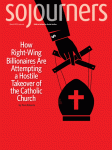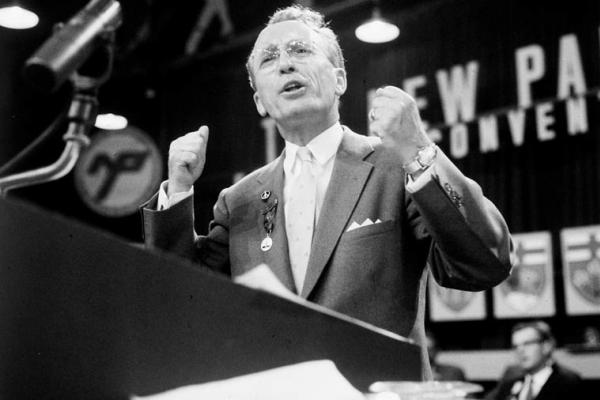THANKS TO CANADA'S universal health-care system, most Canadians have never had to worry about paying medical bills. Everyone gets the care they need, at a cost far below the hit-or-miss U.S. health-care system. It’s little wonder that 94 percent of Canadians boast proudly about their national health care—even more than they hoot about hockey.
Tommy Douglas, the architect of the Canadian single-payer system, rolled out the plan while serving as a five-term premier of Saskatchewan. But Douglas’ drive to ensure health care for all didn’t originate from his politics. It was developed from his faith and his pre-political life as a Baptist minister.
In 1930, when Douglas became pastor at Calvary Baptist Church in Weyburn, Saskatchewan, he joined an agricultural community brutally impacted by drought and economic depression. At first, Douglas focused on intensive relief efforts. Soon he embraced advocacy as well.
As Douglas put it, “You’re never going to step out of the front door into the kingdom of God. What you’re going to do is slowly and painfully change society until it has more of the values that emanate from the teachings of Jesus or from other great religious leaders.”
To Douglas, universal health care was an essential part of such godly change. “How do you talk to a [person] about saving his soul if he’s got a toothache?” he asked. “Or worse, if he’s got a child that needs medical care and can’t get it?”
He successfully campaigned for a universal care system in Saskatchewan. The success of the provincial model led to the 1968 implementation of a “universal, compulsory, tax-financed health insurance program on a national scale,” as described by Joe Gunn in his essay “Charter and Covenant: The Churches and the Struggle for Public Health Care in Canada.”
The faith community helped push the universal-care system to victory. “The history of church involvement in health care is a history of which Canadians can be proud, and build upon,” wrote Gunn. “The churches have not been afraid to enter the political fray around health policy.”
Some faith groups, especially the Catholic Hospital Association, initially doubted the wisdom of a national Canadian insurance system. But the plan was embraced by an ecumenical majority that vigorously pushed for its adoption, overcoming fierce opposition from physician groups and the insurance industry. As one politician complained, “Next you’ll be proposing ‘grocerycare.’”
But people of faith insisted that universal health care was a moral imperative. The Canadian section of the Lutheran Church in America wrote at the time, “Through its emphasis on the stewardship of God’s resources for a man’s [sic] own family and for his neighbor, there is implicit the importance of individual responsibility for the health of others ... In an urban industrial society individual responsibility by itself is insufficient. We are very much interdependent. Therefore, Christian concern involves a great deal more than the responsibility for one’s own health and personal concern for the sick and dying. ... When it becomes concerned with justice it ought to see health as a fundamental human right.”
Since the adoption of Canada’s Medicare system, the Ecumenical Health Care Network continues to defend access to care, resist privatization, and push for expansion into prescription drug coverage and home care. People of faith in Canada take these actions in the spirit of Tommy Douglas, the Baptist minister-turned-politician who pioneered their program.

Got something to say about what you're reading? We value your feedback!






